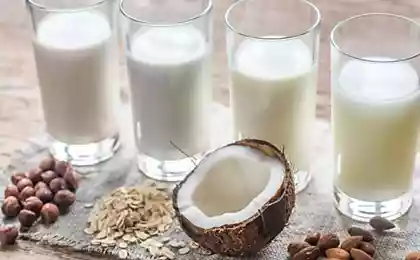162
This Is What Happens To Your Body If You Drink Yogurt Every Day
I like candy. And all because it is made from one spoonful of sugar. This is the rarest example of a food that has less sugar than it seems. About the dangers of cola, chips and sweets is known even to a schoolboy, but how is the matter with dairyDiet yogurt and baby curds?

DepositPhotos
Natural yogurt? At one time I tried to lose weight on a dairy diet. I don't like kefir, so I ate delicious ones. yogurt with and without fillers. I can't tell you how disappointed I am when, after a week of eating like this, my weight increased by 2 kilograms! I immediately returned to my usual diet, but my bowel protested. He protested for 3 days, surrendered only after a gastroenterologist prescribed lactulose syrup.
The doctor explained what errors caused this complication. The fault of all those drinking yogurts with an incredible amount of sugar and lack of nutrients!
If we're just talking about sweets, physicians men consume no more than 36 grams of sugar per day, and women – only 20. It is necessary to evaluate not only sugar sand, but all foods eaten, including fruits. Exceeding the “sweet” boundaries is fraught with obesity, diabetes, heart and brain problems.

DepositPhotos Dairy products They were always considered useful. If you believe television advertising, they collected the maximum concentration of nutrients and all sorts of “live” bacteria. But let’s take a look at the classic drinking yogurt. First on the list is dairy raw materials, then sugar or fruit sugar syrup. Next, thickeners and additives “identical to natural”
Sin by adding sugar and manufacturers of low-fat yogurts. In a bottle of 300 milliliters contains 8 spoons, which is more than 2 times the permissible daily allowance for women! Do not even plan to lose weight on drinking yogurt, you risk gaining a couple of pounds.
On the labels you can often find two names - yogurt and yogurt. But what's the difference? Experts from research institutes say that both are useless, even if they do not contain antibiotics, preservatives and vegetable fats. Natural yogurt should contain 11 million beneficial bacteria per 1 gram of product. But none of the test samples taken from store shelves meets the stated readings. The number of bacteria detected is 100 times less than what is written on the label.

DepositPhotos
In the yogurt product, there should be no bacteria at all, neither useful nor harmful, because yogurt This method involves high-temperature processing (pasteurization). Roughly speaking, a yogurt product is canned milk that can be stored at room temperature.
“Lactic acid bacteria tend to inhibit the growth of harmful microflora, which is why they are so beneficial for digestion and for the intestines. That is why preservatives in yogurt are not used in principle - they are simply not needed there, because useful microbes cope with harmful microbes. Unfortunately, not all manufacturers are competent enough in such matters, and it is easier for them to be safe and “boil” yogurt than to take the risk and produce a “live” product. We end up buying and eating yogurt thinking we care about our health, but we actually do. We do not bring any benefit to the body.?

DepositPhotos is another trick for buyers. calcium. In yogurt without additives should be at least 110 mg of calcium per 100 g of product. But testing in the laboratory has established other data, which is 2-3 times less than indicated! In my children’s favorite “Splinter” calcium was even less than in milk!
Calcium saturation is a completely useless procedure. According to nutritionist Lyudmila Denisenko, “Often manufacturers enrich yogurt or other dairy products with inorganic calcium.” barely digestible. And the lack of calcium in foods is aggravated by the fact that the body absorbs it worse if yogurt is also fat-free. In addition, defatting milk, we deprive it of fat-soluble vitamins (A and D), and vitamin D promotes the absorption of calcium.

DepositPhotos
Drinking yogurts with fruit-filled They are rich in flavors and dyes, and there are very few beneficial bacteria in them. No one adds natural vanilla to dairy products, otherwise no one would buy them. A synthetic substitute is used, which may contain the following substances: vanillin lignin (a by-product of the pulp wood waste industry), ethyl vanillin (compounds from coal tar) or coumarin (a similar flavoring, but very toxic).
Another problem with dairy products. expiration date. A simple rule will help you choose a useful product – choose yogurt with fewer ingredients in the composition and a minimum shelf life. Optimally up to 5-7 days. Just imagine how much chemistry you need to use to keep a dairy dessert for up to 30 days!

DepositPhotos
Very often carriers, shops and supermarkets violate temperature-storage. This product becomes extremely dangerous. It is good if it “carries”, but serious poisoning is not excluded!
“Elevated Lactobacilli”, “carefully selected natural ingredients”, “normalizes metabolism and improves digestion” – all these are tricks for the buyer! You need to read labels carefully, and it is best to make yogurt from milk using natural lactic acid bacteria.
Homemade yogurt is much more delicious and useful in it much more. You can add nuts, fruits, honey and enjoy a natural product.

DepositPhotos
If the article was useful to you, show it to your friends on social networks. Many people don’t read the labels on dairy products.
We care about your opinion. dairyHow to choose useful and quality? Don't forget to write a comment.

DepositPhotos
Natural yogurt? At one time I tried to lose weight on a dairy diet. I don't like kefir, so I ate delicious ones. yogurt with and without fillers. I can't tell you how disappointed I am when, after a week of eating like this, my weight increased by 2 kilograms! I immediately returned to my usual diet, but my bowel protested. He protested for 3 days, surrendered only after a gastroenterologist prescribed lactulose syrup.
The doctor explained what errors caused this complication. The fault of all those drinking yogurts with an incredible amount of sugar and lack of nutrients!
If we're just talking about sweets, physicians men consume no more than 36 grams of sugar per day, and women – only 20. It is necessary to evaluate not only sugar sand, but all foods eaten, including fruits. Exceeding the “sweet” boundaries is fraught with obesity, diabetes, heart and brain problems.

DepositPhotos Dairy products They were always considered useful. If you believe television advertising, they collected the maximum concentration of nutrients and all sorts of “live” bacteria. But let’s take a look at the classic drinking yogurt. First on the list is dairy raw materials, then sugar or fruit sugar syrup. Next, thickeners and additives “identical to natural”
Sin by adding sugar and manufacturers of low-fat yogurts. In a bottle of 300 milliliters contains 8 spoons, which is more than 2 times the permissible daily allowance for women! Do not even plan to lose weight on drinking yogurt, you risk gaining a couple of pounds.
On the labels you can often find two names - yogurt and yogurt. But what's the difference? Experts from research institutes say that both are useless, even if they do not contain antibiotics, preservatives and vegetable fats. Natural yogurt should contain 11 million beneficial bacteria per 1 gram of product. But none of the test samples taken from store shelves meets the stated readings. The number of bacteria detected is 100 times less than what is written on the label.

DepositPhotos
In the yogurt product, there should be no bacteria at all, neither useful nor harmful, because yogurt This method involves high-temperature processing (pasteurization). Roughly speaking, a yogurt product is canned milk that can be stored at room temperature.
“Lactic acid bacteria tend to inhibit the growth of harmful microflora, which is why they are so beneficial for digestion and for the intestines. That is why preservatives in yogurt are not used in principle - they are simply not needed there, because useful microbes cope with harmful microbes. Unfortunately, not all manufacturers are competent enough in such matters, and it is easier for them to be safe and “boil” yogurt than to take the risk and produce a “live” product. We end up buying and eating yogurt thinking we care about our health, but we actually do. We do not bring any benefit to the body.?

DepositPhotos is another trick for buyers. calcium. In yogurt without additives should be at least 110 mg of calcium per 100 g of product. But testing in the laboratory has established other data, which is 2-3 times less than indicated! In my children’s favorite “Splinter” calcium was even less than in milk!
Calcium saturation is a completely useless procedure. According to nutritionist Lyudmila Denisenko, “Often manufacturers enrich yogurt or other dairy products with inorganic calcium.” barely digestible. And the lack of calcium in foods is aggravated by the fact that the body absorbs it worse if yogurt is also fat-free. In addition, defatting milk, we deprive it of fat-soluble vitamins (A and D), and vitamin D promotes the absorption of calcium.

DepositPhotos
Drinking yogurts with fruit-filled They are rich in flavors and dyes, and there are very few beneficial bacteria in them. No one adds natural vanilla to dairy products, otherwise no one would buy them. A synthetic substitute is used, which may contain the following substances: vanillin lignin (a by-product of the pulp wood waste industry), ethyl vanillin (compounds from coal tar) or coumarin (a similar flavoring, but very toxic).
Another problem with dairy products. expiration date. A simple rule will help you choose a useful product – choose yogurt with fewer ingredients in the composition and a minimum shelf life. Optimally up to 5-7 days. Just imagine how much chemistry you need to use to keep a dairy dessert for up to 30 days!

DepositPhotos
Very often carriers, shops and supermarkets violate temperature-storage. This product becomes extremely dangerous. It is good if it “carries”, but serious poisoning is not excluded!
“Elevated Lactobacilli”, “carefully selected natural ingredients”, “normalizes metabolism and improves digestion” – all these are tricks for the buyer! You need to read labels carefully, and it is best to make yogurt from milk using natural lactic acid bacteria.
Homemade yogurt is much more delicious and useful in it much more. You can add nuts, fruits, honey and enjoy a natural product.

DepositPhotos
If the article was useful to you, show it to your friends on social networks. Many people don’t read the labels on dairy products.
We care about your opinion. dairyHow to choose useful and quality? Don't forget to write a comment.
The wife of Valery Meladze Albina Dzhanabayeva shared the details of the system! Just 2 teas...
Great dress with your own hands for 1 evening! No more foot in expensive shops and boutiques.























